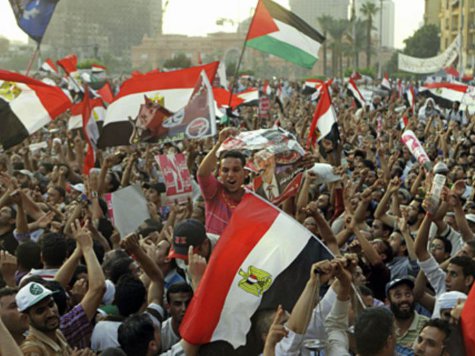One month ago Egypt became the Middle East’s newest democracy. For over a year blood and anger was mixed with the optimism of youth and the promise of the new in Cairo’s Tahrir Square. Ultimately, the determination of the Egyptian people was rewarded by the removal of a dictator and the formation of a new, democratically elected government.
In a less-than-perfect election with about 50% voter turnout, slightly over half of those who did vote elected a fundamental Islamist government, headed by Muslim Brotherhood candidate Mohamed Morsi. Morsi ran as a candidate of the people and a product of the revolution putting forward a 100-day, 64-point plan to get Egypt back on its feet. After nearly a year and a half of revolution and demonstrations, it was a welcome message.
Leon Panetta was in Egypt on Tuesday, leaving with high praise for Morsi, saying, “It’s clear that Egypt, following the revolution, is committed to putting in place a democratic government. I am confident that democracy here will fully represent a number of (political) views.” Good that he is happy, as the Obama administration circumvented Congress to provide the Muslim Brotherhood with $1.5 billion in funding for their new government. The eyes of the world are on them, so you would expect Egypt’s new leadership to do their best to deliver. So how do Egyptians see the Morsi government’s performance so far?
Morsi Meter is a website comparing the promises of the campaign to the reality of governance. On Mr. Morsi’s 64-point plan across five major categories–Security, Traffic, Bread, Cleanliness and Fuel–according to the Morsi Meter he has managed to deliver on one. The “Clean Homeland Campaign” is in full effect. This turns out to be a generous assessment, however, as Ahram Online, a leading Egyptian news agency, gives Morsi a zero, since there has not been a single policy created or articulated concerning the administration of waste. Admittedly, a month is not a long time, but he did only give himself 100 days.
So public service announcements aside, what have the avatars of democracy in Egypt given their attention in the last month? They are working on a constitution. Egypt’s first constituent assembly was thrown out by the court for not being representative of the people, with Christians and women being particularly under-represented. A second assembly labors under similar criticism, but that has not stopped them from taking up the hard work of the people.
Topping the list is saluting the flag. Members of the Muslim Brotherhood’s ultra-conservative Salafist party do not like to stand during the Egyptian national anthem, and they do not like saluting the Egyptian flag. Critics argue that the people responsible for writing the constitution for a country should probably show respect to its flag. They should definitely take their time and get this one right.
Another sticky point is Article Two of the constitution, which reads in part, “Islam is the religion of the state, Arabic is the official language, and the principles of Islamic Sharia are the primary source of legislation.” Members of the Brotherhood would like to replace the words “principles” and “primary” with “laws” and “sole.” This is a key point for Egypt’s non-Muslim population, as some version of freedom of religion is likely to exist in the constitution. However, if all are judged under Islamic law, then the freedom to practice your chosen religion is a thin one indeed.
Other issues on the plate include whether or not to extend freedom of religion to all religions or just the Abrahamic faiths. Is Egypt primarily an African state or an Arab/Islamic state? And who is sovereign and from where does the state derive its power — from the people or God? The Brotherhood favors the latter in all cases.
It is unfortunate, but what Egyptians are experiencing is the reality of democracy rather than its promise. The 64-point plan was a pragmatic direction for the government to take that directly addressed the immediate needs of the Egyptian people. Instead of working on the neglected needs of the people, the very reason that revolution came about in the first place, Egypt’s politicians have decided to work on their power and how better they can apply it to the people from the point of view of the governing, not the governed.
It would have been nice for the Egyptian people to get to live the fairy tale of democracy for a while, but that has not been the norm in the Middle East. The nice thing about democracy is that when you make a mistake concerning your elected government, you get a chance to correct it most of the time. An oft-applied axiom to Middle-Eastern democracy is, “One man, one vote, one time.” Unfortunately, the last people to vote a Muslim Brotherhood government into power, the Gazans in 2006 in the form of Hamas, have yet to have the opportunity to correct the mistake.
As sectarian violence and religious oppression begin to occupy more of the headlines coming out of Egypt, the hope is that the people hold their new government to task as fervently as they got rid of the last one. With the military operating separately and generally as an agent of the people, now is the time for the Egyptians to make sure they get it right. There is only one thing all parties concerned need to keep in mind to make it work, Democracy, in all its forms, is about government’s service to the people from which it derives its only power–the consent of the governed.

COMMENTS
Please let us know if you're having issues with commenting.